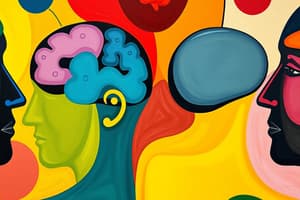Podcast
Questions and Answers
What is human behavior?
What is human behavior?
- Physical actions that can be seen or heard (correct)
- Only actions performed in organizations
- Behavior that is universal and exclusive to leaders
- None of the above
Human behavior can only be observed in organizational settings.
Human behavior can only be observed in organizational settings.
False (B)
What are two factors affecting human behavior mentioned in the content?
What are two factors affecting human behavior mentioned in the content?
Attitudes and social norms
Every person is a _______ organism.
Every person is a _______ organism.
Which principle states that satisfying behavior is likely to be repeated?
Which principle states that satisfying behavior is likely to be repeated?
What differentiates a 'human act' from an 'act of man'?
What differentiates a 'human act' from an 'act of man'?
What is true about the predictive nature of human behavior?
What is true about the predictive nature of human behavior?
Almost all behavior is _______.
Almost all behavior is _______.
Social norms have no influence on an individual's behavior.
Social norms have no influence on an individual's behavior.
What role do humans play in an organization?
What role do humans play in an organization?
Which of the following are factors affecting human behavior? (Select all that apply)
Which of the following are factors affecting human behavior? (Select all that apply)
Act of Man refers to actions performed freely with alternatives to choose from.
Act of Man refers to actions performed freely with alternatives to choose from.
What does the term 'human act' imply?
What does the term 'human act' imply?
Match the behavioral science assumptions with their descriptions:
Match the behavioral science assumptions with their descriptions:
Describe Thorndike's law of effect.
Describe Thorndike's law of effect.
Almost all behavior is unlearned.
Almost all behavior is unlearned.
What is meant by individuals adapting to their environment?
What is meant by individuals adapting to their environment?
Flashcards are hidden until you start studying
Study Notes
Human Behavior in Organizations
- Human behavior is crucial for organizations, as individuals are central to the success of any company.
- Organizations consist of diverse people with various backgrounds, beliefs, and behaviors.
Factors Affecting Human Behavior
- Attitudes influence behavior through favorable or unfavorable evaluations of specific actions.
- Social Norms shape individual behavior based on perceived pressure to conform or deviate from a particular course of action.
- Perceived Behavioral Control relates to an individual's belief in their ability to perform a specific behavior, regardless of how easy or difficult it may appear.
Key Assumptions, Concepts, and Principles
- Human Act implies purposeful action with free will, accompanied by the ability to choose between alternatives.
- Act of Man involves actions performed under duress, limiting free choice and eliminating accountability.
- Individuals are unique from birth due to diverse genetics and life experiences, resulting in distinct physical, mental, social, and psychological attributes.
- Human beings are constantly active, motivated by goals, needs, drives, and desires.
- Individuals are dynamic and constantly adapting to their environment, influenced by various forces.
- Organizational characteristics impact the behavior of the entire organization and its members.
- Predicting behavior with complete accuracy is impossible due to varying needs and values.
- There is no single, perfect solution for managing people or designing an ideal organization.
Concepts
- Learning significantly influences behavior, shaping both children and adults.
- Human beings adapt to new environments in accordance with their needs and value systems.
- Adopted behaviors become part of the organization's culture.
Principles
- Thorndike's Law of Effect: Behavior followed by positive consequences is likely to be repeated, while behavior followed by negative consequences is likely to be suppressed.
- Stimuli impact our senses (sight, hearing, smell, taste, touch) and influence our behavior through their frequency, recency, and intensity.
- Behavior is caused by various factors, making predicting behavior challenging.
Human Behavior in Organizations
- Individuals play a crucial role within organizations.
- Organizations are comprised of diverse individuals with varying characteristics, beliefs, and behaviors.
- Human behavior encompasses physical actions, thoughts, feelings, and sentiments, exhibited both within and outside organizations.
Factors Influencing Human Behavior
- Attitudes: Attitudes influence the degree to which an individual exhibits a certain behavior.
- Social Norms: Social norms, perceived by individuals, influence their actions by creating pressure to perform (or not) specific behaviors.
- Perceived Behavioral Control: Beliefs about how easy or challenging it is to perform a behavior influence individual choices.
Key Behavioral Science Assumptions:
- Individual Uniqueness: Each person is unique from conception, undergoing constant development throughout life.
- Goal-Oriented Nature: Individuals are goal-seeking organisms, driven by needs, desires, and wants.
- Dynamic Individuals: People are constantly changing and adapting to their surroundings.
- Organizational Impact: Organizational characteristics influence both overall organizational behavior and individual behavior within it.
- Unpredictability: Complex human behavior arising from individual needs and values makes it difficult to predict with complete accuracy.
- No One-Size-Fits-All Solutions: There are no universal formulas for working with people.
Concepts:
- Learned Behavior: Most human behavior is learned over time, and individuals adapt to their environments based on their needs and values.
- Cultural Adoption: New learning that aligns with an individual's value system is adopted and becomes part of their culture.
Principles:
- Thorndike's Law of Effect: Behavior followed by positive consequences is likely to be repeated, while behavior followed by negative consequences tends to be extinguished.
- Stimuli: Stimuli, impacting our sensory organs, influence our behavior. The impact of stimuli depends on their frequency, recency, and intensity.
- Multiple Causality: Behavior is caused, but its causality is complex and often involves multiple factors.
- Behavior Shaping: Environmental factors influence behavior, emphasizing the importance of conscious and unconscious conditioning.
- Continuous Improvement: Efforts to improve human behavior are ongoing and require continual learning and adaptation.
Studying That Suits You
Use AI to generate personalized quizzes and flashcards to suit your learning preferences.




